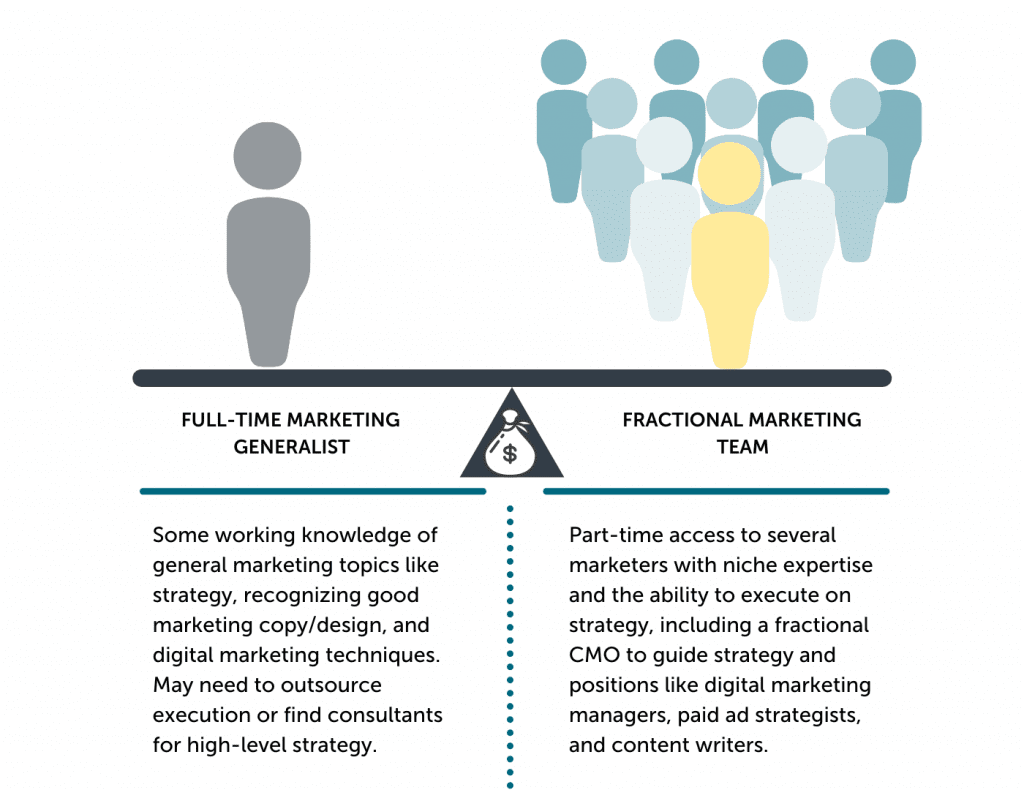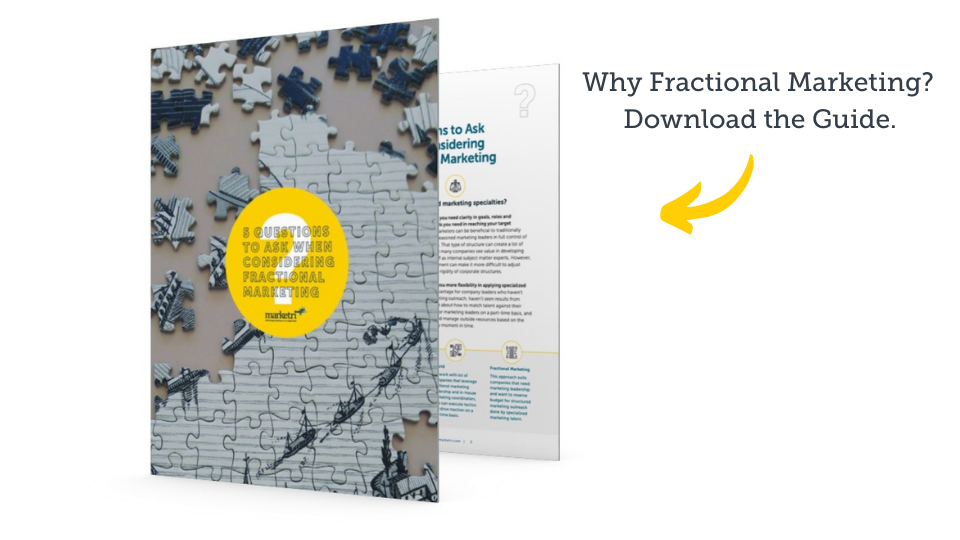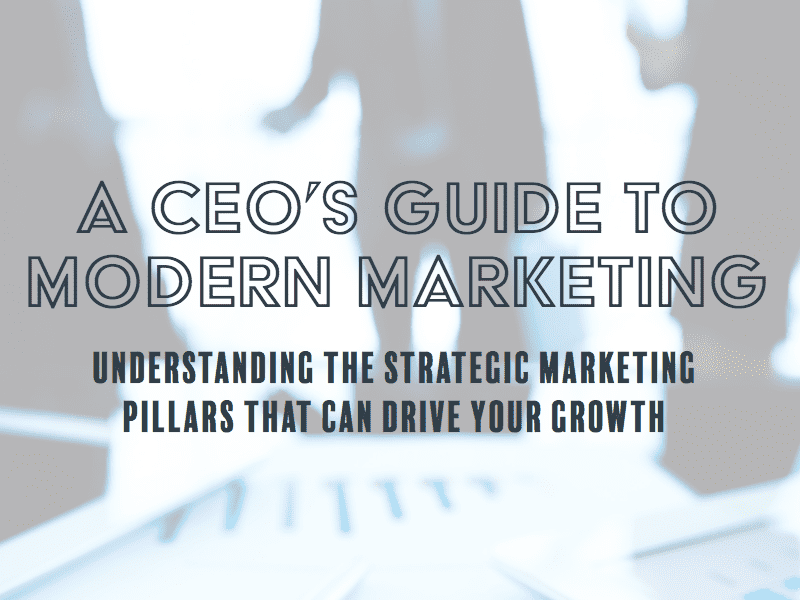Fractional Marketing: Everything to Know Before Making a Hire
Growth-minded companies know that strategic marketing can power up their business by generating significant, predictable revenue. But engaging in effective strategic marketing isn’t so simple anymore, especially for middle-market B2B companies.
You need to attract and nurture leads through a buying journey that’s almost entirely digital.
You need the right combination of marketing strategies, execution, and technology to keep them moving further down your revenue funnel.
You need more marketing disciplines—and more rigor—to get it right.
And you need analytics to ensure your marketing is data-driven, not gut-driven.
In today’s B2B buying environment, no single marketing generalist can do it all. Yet, middle market companies don’t have the luxury of hiring a huge team with the full scope of capabilities, expertise, and experience it takes to engage in growth marketing that gets results.
Fractional marketing is increasingly the solution.
How Fractional Marketing Works

As the phrase suggests, fractional marketing involves contracting for a fraction or slice of one or more marketers—whether to supplement your in-house team’s capabilities, fill a vacant role, plug a particular expertise or skill gap, or even outsource your marketing function entirely.
Fractional marketing is an effective way to build your team without tying up a lot of salary dollars, leaving you with more budget for marketing execution and infrastructure. It’s also a great way to gain the flexibility to tap into the specific marketing skillsets you need as your business needs and goals evolve.
Let’s say you don’t have the marketing automation tools it takes to meet your leads where they are at, every stage of the buying journey. You’re going to need a resource with the knowledge and skills to help you choose and set up the technology it takes to do effective growth marketing. But once you have the right technology in place, configured to your business, with workflows built to support campaigns, you probably need a lot less martech help ongoing.
That’s one of many examples where the ability to flex your fractional marketing resources to match your needs at that time is a huge win for middle market B2B companies.
Why You Need a Fractional CMO at the Helm
While any marketing discipline can fit the fractional model, one role that many middle market companies take a fractional approach to fill is the Chief Marketing Officer (CMO).
A CMO is an experienced, senior-level leader who develops a sound marketing strategy and comprehensive marketing plan, gets buy-in for those foundational elements, and directs the effective execution of your marketing. It’s a role you can’t do without. But with the average in-house CMO commanding upwards of $250k a year, it’s a full-time salary you probably can’t afford (not if you expect to have sufficient budget left to fund a growth marketing effort). On top of that, most middle market companies rarely need a CMO full time.
To fill the CMO role effectively and affordably, many companies hire a Fractional CMO instead of a full-time in-house employee. A Fractional CMO steps in and owns your marketing function, applying significant marketing know-how and leadership capabilities. They’re well equipped to develop a solid marketing strategy and strategic marketing plan…and equally adept at leading a team of marketers (whether outsourced or in-house) to execute on that plan successfully.
A Fractional CMO is integral to effective fractional marketing…but shouldn’t be the sum total of your team. The best fractional marketing approach is to focus the CMO’s time and energy on high value-add efforts like strategy development and direction, then use tactical specialists for execution (content development, paid search, social media marketing, and so on).
When It’s Time to Hire a Fractional CMO
Many flags can signal the need for a Fractional CMO specifically and fractional marketing generally. But in our experience, these are the most common triggers:
- Your company has a growth mindset and aggressive goals, but you’re not making much headway in achieving them.
- You’re seeing a poor ROI on your marketing efforts.
- You lack a comprehensive, proactive, strategic marketing plan.
- Your marketers always seem busy, but you’re not confident they’re focusing their time and energy on efforts that will move the needle on revenue growth.
- Your brand isn’t well defined, consistent, compelling, and relevant to your audience.
- Your outbound sales efforts are no longer enough to fuel your growth.
- Your marketing team includes a lot of doers, but no one with the experience to develop and lead the execution of a strategic marketing plan.
- You’re not generating a predictable stream of leads that represent your ideal buyer.
What to Look for in a Fractional CMO (and Supporting Team)
Finding the right Fractional CMO or other fractional team members for your organization goes beyond reviewing resumes and checking all the job description boxes. While a strong marketing background and experience at the senior/strategic level are must-haves for the CMO role, there’s a lot more you should expect to ensure a good outcome.
- A strong strategic mindset. You want a CMO who has lived and breathed strategy. They need to be able to analyze your business’s strengths, weaknesses, opportunities, and threats (through a SWOT analysis), assess your competitive landscape, and develop a strategic marketing plan that sets you up for success.
- Established processes. Growth marketing that generates revenue is methodical and repeatable, so it demands processes that are efficient and effective. A strong Fractional CMO will come to the table with established processes that are proven best practices.
- Willingness to work with your systems or recommend new ones. An experienced marketer is always going to bring along preferences for certain systems, especially when it comes to the technology that growth marketing requires. But if you already have a tool that’s working well, your Fractional CMO should be willing to use it and recommend ways to optimize it. Perhaps your marketers use Asana for project management, but your CMO normally uses Teamwork. Or maybe your marketers aren’t using a project management tool at all. In either case, your CMO shouldn’t require you to adopt their preferred tool.
- Solid relationship building skills. The CMO role demands an ability to relate well cross-functionally within your organization to achieve buy-in for marketing plans that touch multiple operating groups. At the same time, a good CMO will reach across their own network of resources to build on-site or virtual teams that work together effectively.
- Proven track record of results. In this age of data and analytics, expect your Fractional CMO candidates to be able to share metrics that demonstrate they can get relevant results. You’re looking for more leads that convert to more sales that generate more revenue…not fluffy numbers like how many people liked your last social media post.
- An accountability mindset. Accountability goes hand-in-hand with results, so it may go without saying, but we’ll say it anyway: If you hire a fractional professional to lead your marketing, you should expect and allow them to own your marketing function.
If you’re leading a growth-minded company and you’re not seeing the results you want from your marketing, a fractional approach may be the solution. You’ll gain the expertise and capabilities you can’t easily attract in-house, without tying up a disproportionate percentage of your budget on salaries, so you can fund marketing efforts that generate revenue growth.
Marketri offers Fractional CMO services that enable you to realize predictable lead generation and revenue growth, through a proven approach that generates measurable ROI on your marketing investment. Contact our CEO Deb Andrews for a free consultation on our Fractional CMO services!






